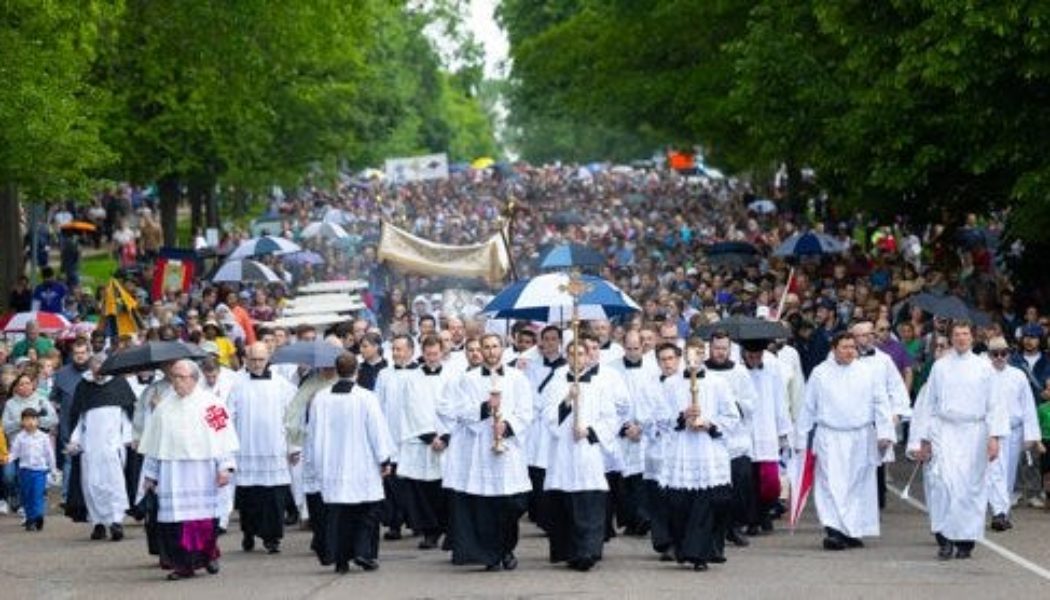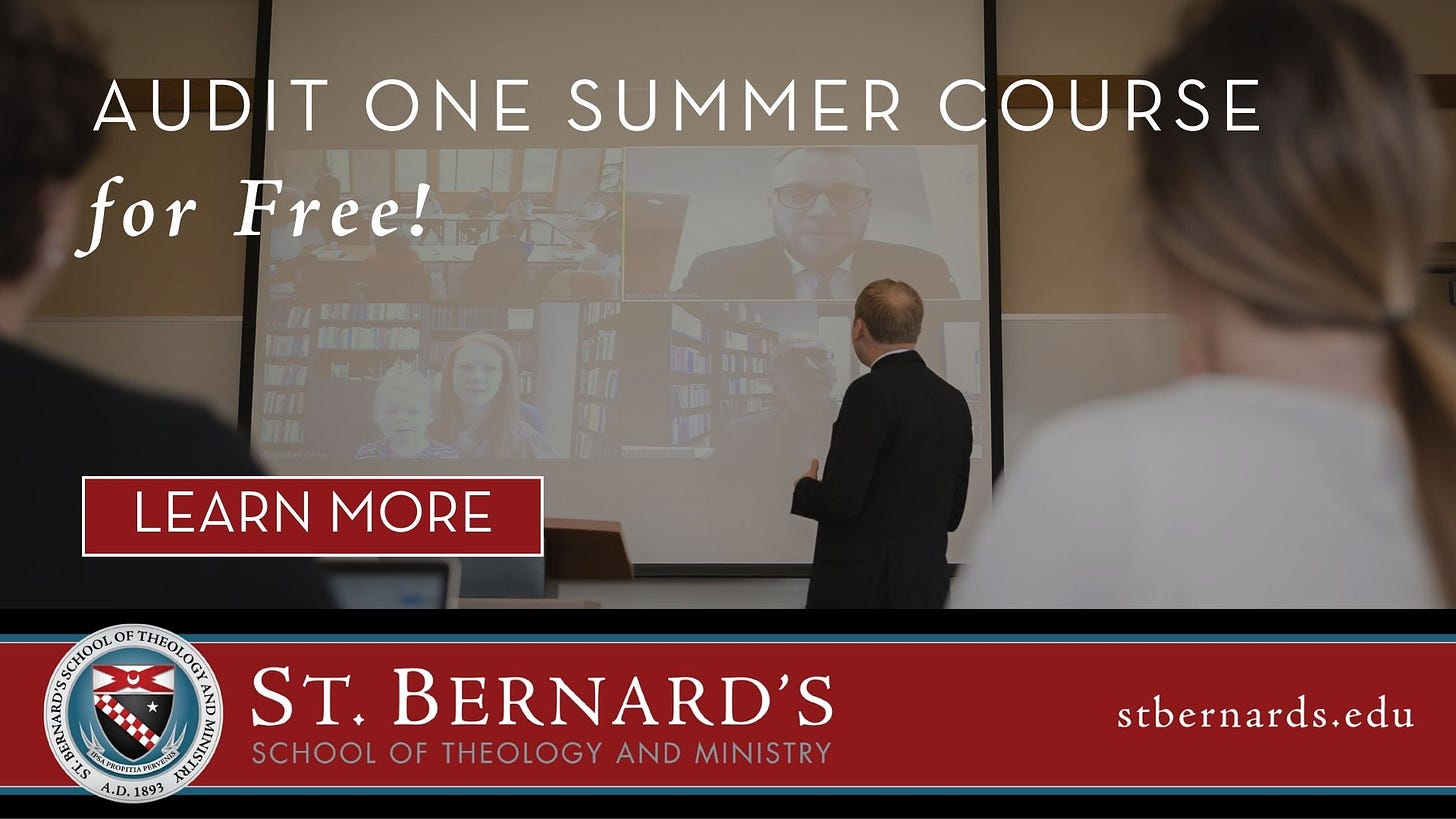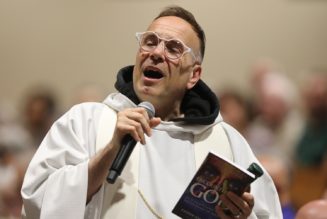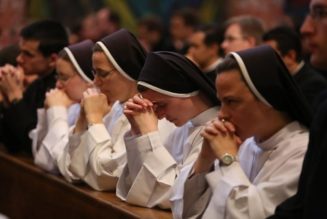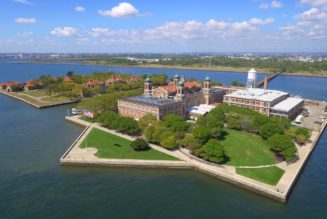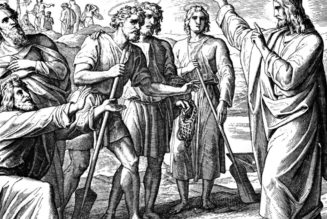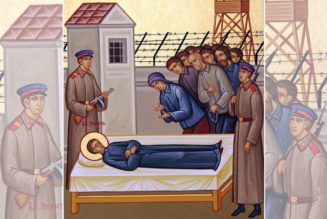Hey everybody,
If you’re American, I hope you were able to celebrate Memorial Day yesterday with some time off from work or school, and looking forward to a good summer. Some of you, I suspect, went to a cemetery to pray for America’s war dead. Some of you went down the shore.
I spent the day with my family — we barbecued with friends, and then I coached my son Davey’s first Little League practice.
Davey is six, so he still thinks I have something to teach him about baseball. I hope that will last at least through his summer season.
Some of you likely participated in the Eucharistic pilgrimages making their way across the U.S. — thousands of people turned up this weekend in New York and in the Twin Cities for major Eucharistic processions connected to the cross-country pilgrimages.

A bishop friend told me yesterday that the procession he participated in was “one of the most beautiful experiences of my life.”
It seems to me these Eucharistic pilgrimages are going to keep gaining momentum over the summer — and are likely to leave lasting impressions among the people who participate.
In fact, whatever comes of the Eucharistic Congress in Indianapolis, I’m becoming convinced that the cross-country pilgrimages might be remembered as the most impactful, meaningful, encouraging, and beautiful aspect of the USCCB’s Eucharistic Revival project.
And maybe the local aspect of the processions is a part of what’s making them successful. It’s one thing for people to go somewhere to hear catechetical talks, to pray together, to worship together — and I sincerely hope that the Eucharistic Congress is a transformative experience for the people who go.
But it’s another thing altogether to come together with the Catholics of your own city, to be reminded how many they are, and to consecrate, in the act of a pilgrimage, the place where you live to the king of the universe.

It is entirely possible that the pilgrimage processions will be just day-long events in some places, which happen and are then forgotten. But I doubt that will be the case in most places. The conditions are ripe in the Church’s life right now for these processions to have long-standing impact on ministry and liturgical practice.
There is an increasing recognition among practicing Catholics of just how out of step their lives are with a rapidly secularizing America. For many, that’s not a bad thing — few of today’s actually practicing Catholics are eager for the assimilation dreams of the American Camelot. More of them are ok with the idea that being Catholic sets them apart, and that makes them more willing than the “conciliar generation” to do things that make them stand out.
In fact many of them are looking for that — finding little enduring in much of contemporary commercial culture, Catholics are looking for meaning in the long-standing devotions and pieties of the faith. And these processions respond directly to that.
So what happens next?
I think pastors will see how meaningful these processions are to their people, and up their games, so to speak, for Corpus Christi.
I think there are likely bishops so buoyed or encouraged by the city-wide walks that they’ll want to see them happen again in years to come — even if they’re not the kind of bishops who might be expected to go in for that kind of thing.
I think young Catholics, especially, the kind who are eager to take up traditional pieties, are going to keep asking for more processions like these — and lots of Catholics, not just trad-friendly zoomers, are going to show up for them.
I think, and I’m being serious here, that this summer of processions could be remembered in the same way that Denver’s 1993 World Youth Day is — as the start of something. As the start of vocations. As the start of new apostolates and movements. As the start of conversions, in dioceses across the United States.
The news
Mestre had only been Archbishop of La Plata since September 2023 — and he said in a statement that the pope asked him to resign because of problems in a suffragan see, confusingly called Mar del Plata, where Mestre used to be the bishop.
All of this is a bit confusing — especially given that the Mar del Plata diocese has had a revolving door of bishops since 2023, with two different prelates resigning from the place in almost no time flat.
All of this signifies something deeply problematic happening in the Argentine episcopate — and in the La Plata province, where Cardinal Victor Fernandez was archbishop before his Vatican appointment last year.
At The Pillar, we’re rolling up our sleeves to investigate all of that.
But for now, to get the lay of the land, read the latest.
Thanks to the generosity of the Knights of Columbus, St. Bernard’s School of Theology and Ministry invites anyone anywhere to audit one summer course entirely free. Application deadline is June 28th. Learn more about topics such as the theological poetics of J.R.R. Tolkien and George MacDonald; Pope St. John Paul II’s “Gospel of Life;” and more!
But Luke Coppen points out in an analysis this week that the real challenge amid the dispute is that it’s not clear who is actually responsible for resolving it — and that blurred lines of responsibility and authority may be making things all the more difficult to address.
The monastery’s schism has made headlines around the world, with a local archbishop trying to meet with the 15 nuns in the monastery, and a confederation of Poor Clare monasteries urging the nuns to reconcile with the Church.
What do you do when a monastery issues a 70-page manifesto, arguing that Pius XII was the last valid pope? How do you reconcile nuns to the Church?
Does it actually work? Can the archdiocese help Catholics be witnesses in their workplaces? Michelle La Rosa aimed to find out.
—
When the USCCB meets next month, bishops will vote on a new “pastoral framework” for youth and young adult ministry, which aims to put listening to young people at the center of evangelical and pastoral activity.
To understand what the framework means, and where it came from, The Pillar talked with Paul Jarzembowski, an associate director at the USCCB’s Committee on Laity, Family Life and Youth.
Is the USCCB’s “Listen, teach, send,” the ministry paradigm of the future? Or will the pastoral framework just get dusty on chancery shelves?
Here’s what the USCCB had to say.
—
If you’re going to the July Eucharistic Congress, please know that I’ll be a co-host at “The Ultimate Catholic Dating Event,” a panel conversation sponsored by The Catholic University of America — with drinks and hors d’oeuvres — that I hope will provide some laughter, some insight, and maybe some dates.
You can find out about it here.
And why am I hosting this?
I got married when I was 23, and I’ve only dated one person (Mrs. Flynn) since even before then. Even still, I’m pretty awkward on even those dates. My sense is that the organizers of this event were looking for a “Drew Carey type,” and I’m the closest they could find. Which is fine — everything will be fun, and the points won’t matter.
But if you’re coming to Indianapolis, whether you’re single or not, you can come to this.
—
That papal ‘gaffe’
The Vatican’s communications office issued a statement this morning, offering a quasi-apology for remarks made by Pope Francis at a recent meeting of the Italian bishops’ conference.
During that meeting, the pope said in executive session that bishops should not admit gay men to seminary, because the Church — and seminaries specifically — have too much “frociaggine” already — a word which has been widely translated as “faggotry,” a slur against gay men that plays on stereotypes about them.
A May 28 statement from the Vatican press office said that the pontiff “never intended to offend, or to express himself in homophobic language,” and that Francis “extends his apologies to those who felt offended by the use of a term, which was reported by others.”
Now, as I mentioned above, I’ve been married for almost half my life, so I know something about apologies.
And this one is interesting. It does not say: “The pontiff regrets that he used derogatory language, when he knows that, as the Catechism teaches, people who have ‘deep-seated homosexual tendencies … must be accepted with respect, compassion, and sensitivity.’”
Instead, the Vatican said effectively that Pope Francis is sorry some people were offended, and that he didn’t mean to use an offensive term — and then it points out that other people were the ones to report the use of the term.
The Vatican’s apology, in the form it was given, is not going to quell another news cycle about this issue. And while the pope’s remarks do affirm his commitment to the Vatican’s 2005 instruction on seminary admissions and gay candidates, the language he apparently used was obviously not in accord with the principles of “respect, compassion, and sensitivity.”
It was, if you will, “locker room talk,” apparently uttered behind closed doors, and the Vatican’s statement is not likely to dampen the criticism.
But in addition to those who (rightly) raise concern about the pontiff’s language, there will also be those who take the news cycle to criticize the policy he was addressing — namely, the one by which the Church sets criteria, based on theological principles, regarding the priestly formation and ordination of men who identify as gay.
On that substantial issue, I expect that this remark will be the occasion at which a cadre of longtime papal supporters — those who believed the pontiff might support a “paradigm shift” on sexual and medical morality — will begin to express more vehemently their discontent with Francis, and their belief that the pontiff misled them.
It won’t be long before we read think pieces in which secular commentators and the theologically “progressive” agonize that the Francis pontificate was never what they wanted it to be, and that he was never the man they’d believed he was.
There’s a comparison here between Francis and Joe Biden, though it’s an imperfect one.
Catholics of the same era, they both use left-leaning rhetoric that makes social (or doctrinal) conservatives very anxious. But within their institutions, both also see a swath to their far left who think they’re part of the problem, rather than the solution, and who are increasingly vocal about that perspective.
For Biden, that swath is made of young Berniecrats, and others who think the president has seriously mishandled the Gaza war.
For Francis, that swath is not as young. It’s mostly comprised of “Spirit of Vatican II” academics and ecclesial types, who believed the pope would do much more to address their discontent with John Paul II and Benedict’s leadership of the Church.
For Biden, this is an electoral problem, and he’ll want to figure out how to shore up support among young Bernie-ish Democrats ahead of November, lest he see them sit out on Election Day.
For Francis, all of that is only a problem for him if he sees the Church in terms of a political institution, and if he sees his pontificate as an “administration” with an agenda, rather than as a period of stewardship.
The problem is that a lot of people, both inside and outside the Church, do see things in that vein — and they’ve come to see pontificates as opportunities to advance their theological or practical agendas for the Church, largely to the extent that their “parties” are in or out of power.
Anyone who sees a papacy this way is in need of a rethink. And to the extent to which the Church has absorbed that mentality into her way of living, we all need a rethink.
In fact, it is the case that in the next several decades, the Church will need to reflect more on how we present and talk about the papacy, lest it becomes increasingly framed as a kind of oracular position occupied by a guru — or as a purely political position, whose aim is to advance the platform of his ecclesial party.
The papacy is an exercise of vicarious authority — the pope holds the keys, as we all await the return of the Lord. And an eschatological view of the papacy should remind us that a vicar is principally a steward — his job is to faithfully pass down what he has received, to help it prosper and flourish, both to preserve it, and to till it, as a gardener.
To the extent that the pope should have an “agenda” or a “platform,” it’s to do those things.
That may well be how Francis sees the papacy — as a stewardship of mysteries beyond our comprehension. It may well be how his recent predecessors saw it too. But to the extent that within the Church, any of us allow ourselves to see the pope as a kind of Ur-President, we will be inevitably disappointed.
A pope should never have opinion polls in front of him — and any good one never would. The only audience he needs to please is one — the judgment of Almighty God, whom all of us will face.
At any rate, please be assured of our prayers this week, and please pray for us. We need it.
And if you love The Pillar, today’s the day to become a paying subscriber. Or to upgrade your sub. We rely on you, and we do journalism worth paying for!
Yours in Christ,
JD Flynn
editor-in-chief
The Pillar
Thanks to the generosity of the Knights of Columbus, St. Bernard’s School of Theology and Ministry invites anyone anywhere to audit one summer course entirely free. Application deadline is June 28th. Learn more about topics such as the theological poetics of J.R.R. Tolkien and George MacDonald; Pope St. John Paul II’s “Gospel of Life;” and more!
Comments 32
Services Marketplace – Listings, Bookings & Reviews
